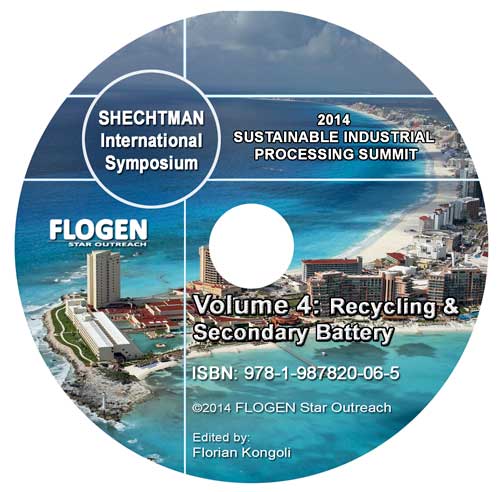2014-Sustainable Industrial Processing Summit
SIPS 2014 Volume 6: Rare Earths & Ionic Liquids
| Editors: | Kongoli F |
| Publisher: | Flogen Star OUTREACH |
| Publication Year: | 2014 |
| Pages: | 432 pages |
| ISBN: | 978-1-987820-08-9 |
| ISSN: | 2291-1227 (Metals and Materials Processing in a Clean Environment Series) |

CD shopping page
Chalmers University of Technology Research on Critical Materials for a Sustainable Society
Teodora Retegan1; Christian Ekberg1; Britt-Marie Steenari1; Cristian Tunsu1;1CHALMERS UNIVERSITY OF TECHNOLOGY, Gothenburg, Sweden;
Type of Paper: Keynote
Id Paper: 309
Topic: 9
Abstract:
Chalmers Tekniska Hoegskola (Chalmers University of Technology) was founded in 1829 following a donation by William Chalmers, director of the Swedish East India Company, and it was transformed into an independent foundation in 1994.
Recycling issues have come more and more in focus in recent years. All needs to be recycled, from plastic bottles to nuclear waste, in order to achieve a sustainable society. What is not so often realized is that most recycling issues are composed of many different questions ranging from highly technological to purely philosophical or including behavior science.
At Chalmers, the recycling activities started already in the 50ies and 60ies when Professor Jan Rydberg was making pioneering work on separation and recycling of metals with high purity from different waste fractions. The main method used then and now was hydrometallurgical methods. In the early 60ies, a well-known apparatus, named AKUFVE and an extended version SISAK-technique have been invented.
The group has evolved along the years but the red line has been kept: recycling and separation of metals by means of solvent extraction mainly from nuclear waste have been conducted.
A dedicated professorship and the first PhD student for Industrial Materials Recycling started in 2007 and in 2012 a second professorship in the same area was promoted. A Competence Center for Recycling (CCR) has been started, where a much wider know-how competence bank has been gathered (e.g. biology, toxicology, physics, practical philosophy and others), thus ensuring a broad, cross-cutting approach to such complex subject.
The current group has several well equipped laboratories for work with radioactive isotopes, high temperature chemistry, ash treatment, solvent extraction (from basic to pilot scale research) and recycling of nuclear waste and nuclear fuels research by means of hydrometallurgical methods. Also, a corresponding fleet of analysis techniques is existent as well.
The newest research interest of the recycling branch of this group is: batteries (e.g. Hydrometallurgical treatment of NiMH batteries - the first ever graduate PhD in the field of Industrial Materials Recycling); WEEE (recycling of REMs from phosphors from lighting products; recycling of ITO and REMS from LCDs; recycling of REMS from CRTs, recycling of magnets from different electronic devices), industrial waste spills (e.g. CIGS solar cells sputtering waste).
All the above projects will make the subject of this lecture, where new methodology and advances in recycling of REMs will be largely discussed.